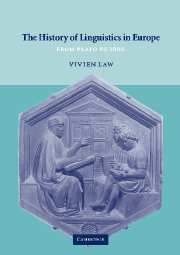Book contents
- Frontmatter
- Dedication
- Contents
- List of illustrations
- List of maps
- List of boxes
- Preface
- 1 Getting ready to study the history of linguistics
- 2 Greek philosophy and the origins of western linguistics
- 3 Towards a discipline of grammar: the transition from philosophy
- 4 From literacy to grammar: describing language structure in the ancient world
- 5 Christianity and language
- 6 The early Middle Ages
- 7 The Carolingian Renaissance
- 8 Scholasticism: linking language and reality
- 9 Medieval vernacular grammars
- 10 The Renaissance: discovery of the outer world
- 11 A brief overview of linguistics since 1600
- 12 Becoming a historian of linguistics
- Research resources in the history of linguistics
- Notes
- Index
Preface
Published online by Cambridge University Press: 05 March 2015
- Frontmatter
- Dedication
- Contents
- List of illustrations
- List of maps
- List of boxes
- Preface
- 1 Getting ready to study the history of linguistics
- 2 Greek philosophy and the origins of western linguistics
- 3 Towards a discipline of grammar: the transition from philosophy
- 4 From literacy to grammar: describing language structure in the ancient world
- 5 Christianity and language
- 6 The early Middle Ages
- 7 The Carolingian Renaissance
- 8 Scholasticism: linking language and reality
- 9 Medieval vernacular grammars
- 10 The Renaissance: discovery of the outer world
- 11 A brief overview of linguistics since 1600
- 12 Becoming a historian of linguistics
- Research resources in the history of linguistics
- Notes
- Index
Summary
‘You're writing a textbook on the history of linguistics? That's impossible: only a team can do it now.’ That was the reaction of a French colleague when, back in 1990, I told her I was writing this book. On a practical level she was right. As the German scholar Peter Schmitter pointed out a year later, the history of linguistics was then growing faster than any other subdiscipline of linguistics. Even in the late 1980s, over five hundred publications were appearing annually in the history of linguistics, more than twice as many as in syntax, semantics or phonetics, its nearest competitors. No one person can claim to have read all the literature, or even a large percentage of it, much less all the primary literature – all the writings which touch upon language, whether by philosophers, theologians, grammarians, psychologists, anatomists, educationalists or indeed linguists – from every era and every corner of Europe. We are necessarily specialists. All the same, however, most historians of linguistics have to teach. When we pluck up the courage to do so, we overcome our private panic at the torrent of secondary literature and the daunting jungle of sources, in order to guide our students to the overviews from which they can get some sense of the overall shape of the subject. Naturally we linger in our own favourite spots, hurrying past those of our colleagues with scarcely a glance. What we lose by being selective, though, we gain by becoming alive to the grand themes and recurring patterns of the 2,500 years of European intellectual history.
- Type
- Chapter
- Information
- The History of Linguistics in EuropeFrom Plato to 1600, pp. xv - xviiiPublisher: Cambridge University PressPrint publication year: 2003

